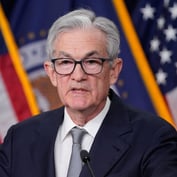(Bloomberg) — U.S. stocks climbed toward a record and European equities rose for the first time in three days as optimism on economic strength offset concern over Ukraine. U.S. Treasuries fell and Spanish bonds retreated.
The Standard & Poor’s 500 Index rose 0.3 percent at 11 a.m. in New York after yesterday closing near a record. The Europe Stoxx 600 Index added 0.5 percent, while Russia’s Micex slid 2.3 percent in the first day of trading this week. Spanish government bonds fell, pushing the 10-year yield up from near an eight-year low. The Swiss franc retreated from the strongest level in more than two years versus the dollar. Oil dropped a second day on concern that U.S. supplies rose an eighth week.
Germany’s current account surplus came in higher than economists’ estimates as exports jumped more than projected, while data showed U.K. factory production rose more than forecast. Russia showed no signs of yielding in the Crimean standoff as Ukraine bolstered its defenses. Japan’s Topix index capped its fifth advance in six days as the Bank of Japan maintained a pledge to expand the monetary base.
“The equity market is going to make continued progress in a two steps forward, one step back kind of progression,” Jim Russell, who helps oversee $115 billion as a senior equity strategist for U.S. Bank Wealth Management, said by phone. “We’re still evaluating how much of the economic weakness is weather related and how much of it is legitimate.”
U.S. stocks
Seven of 10 main industries in the S&P 500 rose today, with technology and health-care stocks pacing gains. The Chicago Board Options Exchange Volatility Index, a gauge for U.S. stock volatility, fell 2.3 percent.
J.C. Penney Co. jumped 8.9 percent after Citigroup Inc. raised its recommendation on the retail chain. Urban Outfitters Inc. dropped 5.4 percent after saying it remains cautious about its performance in the first quarter.
The S&P 500 rallied 4.3 percent in February after Federal Reserve Chair Janet Yellen said the economy was strong enough to withstand measured reductions to the central bank’s monthly bond purchases. Three rounds of Fed stimulus have helped push the S&P 500 up 177 percent from a 12-year low, as U.S. equities begin the sixth year of a bull market that started March 9, 2009.
The Fed is trying to determine how much of the recent economic cooling has been due to the weather. U.S. employers added more workers than estimated in February, a Labor Department report showed last week. Other reports indicated manufacturing expanded faster than projected last month, while consumer spending rose more than estimated in January.
Bond yields
U.S. 10-year Treasury yields rose two basis points to 2.79 percent as data showed U.S. wholesale inventories widened in January, adding to signs the economy continued to strengthen amid stormy winter weather.
The Stoxx Europe 600 Index added 0.6 percent after falling 0.5 percent yesterday to a one-week low. A gauge of carmaker and auto-parts stocks jumped as much as 1.2 percent after a report showed German exports increased more than forecast in January.
Volkswagen AG, Europe’s biggest automaker, gained 1.4 percent. Its Audi AG unit delivered more cars than Bayerische Motoren Werke AG’s namesake brand in the first two months of the year, becoming the world’s best-selling luxury-auto nameplate.
Yields on Spanish bonds rose two basis points to 3.33 percent.
“Investors can be more confident if the core of Europe is doing well,” said Carsten Hilck, who oversees about $6.9 billion at Union Investment Privatfonds GmbH in Frankfurt. “Germany is still a very strong exporter and the economy is on the right track. Investors can get very nervous with geopolitical risk but there’s a lot of liquidity to stabilize the market as soon as prices come down.”








 March 11, 2014 at 12:09 PM
March 11, 2014 at 12:09 PM









